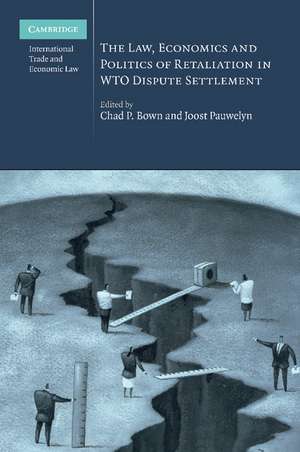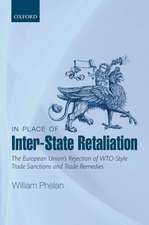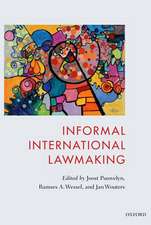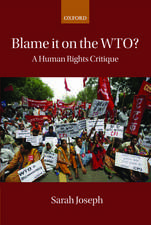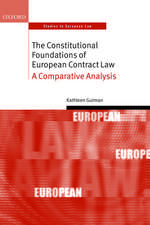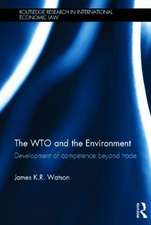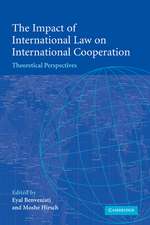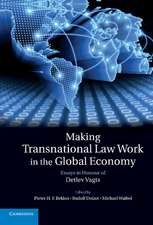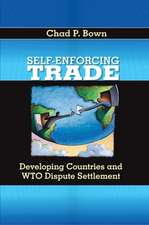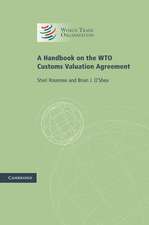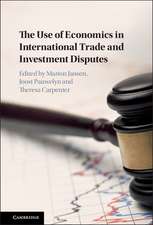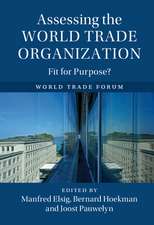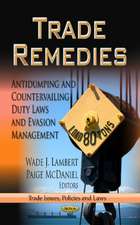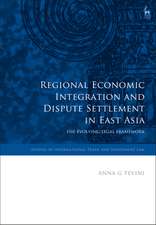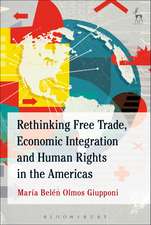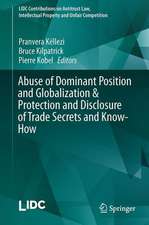The Law, Economics and Politics of Retaliation in WTO Dispute Settlement: Cambridge International Trade and Economic Law, cartea 3
Editat de Chad P. Bown, Joost Pauwelynen Limba Engleză Paperback – 2014
| Toate formatele și edițiile | Preț | Express |
|---|---|---|
| Paperback (1) | 439.01 lei 6-8 săpt. | |
| Cambridge University Press – 2014 | 439.01 lei 6-8 săpt. | |
| Hardback (1) | 1019.10 lei 6-8 săpt. | |
| Cambridge University Press – 6 ian 2010 | 1019.10 lei 6-8 săpt. |
Din seria Cambridge International Trade and Economic Law
-
 Preț: 177.62 lei
Preț: 177.62 lei -
 Preț: 271.22 lei
Preț: 271.22 lei -
 Preț: 284.39 lei
Preț: 284.39 lei - 23%
 Preț: 692.50 lei
Preț: 692.50 lei -
 Preț: 177.47 lei
Preț: 177.47 lei - 14%
 Preț: 699.45 lei
Preț: 699.45 lei -
 Preț: 216.93 lei
Preț: 216.93 lei - 14%
 Preț: 698.61 lei
Preț: 698.61 lei -
 Preț: 321.52 lei
Preț: 321.52 lei -
 Preț: 272.97 lei
Preț: 272.97 lei -
 Preț: 323.05 lei
Preț: 323.05 lei - 14%
 Preț: 868.71 lei
Preț: 868.71 lei -
 Preț: 292.88 lei
Preț: 292.88 lei -
 Preț: 288.42 lei
Preț: 288.42 lei - 23%
 Preț: 642.03 lei
Preț: 642.03 lei -
 Preț: 178.30 lei
Preț: 178.30 lei -
 Preț: 432.05 lei
Preț: 432.05 lei -
 Preț: 320.17 lei
Preț: 320.17 lei - 23%
 Preț: 753.36 lei
Preț: 753.36 lei - 11%
 Preț: 636.34 lei
Preț: 636.34 lei - 23%
 Preț: 615.99 lei
Preț: 615.99 lei - 14%
 Preț: 703.74 lei
Preț: 703.74 lei -
 Preț: 285.37 lei
Preț: 285.37 lei - 14%
 Preț: 699.45 lei
Preț: 699.45 lei - 14%
 Preț: 786.62 lei
Preț: 786.62 lei -
 Preț: 314.82 lei
Preț: 314.82 lei - 14%
 Preț: 895.68 lei
Preț: 895.68 lei - 14%
 Preț: 708.14 lei
Preț: 708.14 lei - 14%
 Preț: 1015.31 lei
Preț: 1015.31 lei - 14%
 Preț: 896.85 lei
Preț: 896.85 lei -
 Preț: 405.20 lei
Preț: 405.20 lei -
 Preț: 322.51 lei
Preț: 322.51 lei - 14%
 Preț: 727.26 lei
Preț: 727.26 lei -
 Preț: 283.79 lei
Preț: 283.79 lei - 14%
 Preț: 727.59 lei
Preț: 727.59 lei - 14%
 Preț: 785.48 lei
Preț: 785.48 lei
Preț: 439.01 lei
Nou
Puncte Express: 659
Preț estimativ în valută:
84.01€ • 87.21$ • 70.05£
84.01€ • 87.21$ • 70.05£
Carte tipărită la comandă
Livrare economică 22 martie-05 aprilie
Preluare comenzi: 021 569.72.76
Specificații
ISBN-13: 9781107655355
ISBN-10: 1107655358
Pagini: 692
Dimensiuni: 152 x 229 x 35 mm
Greutate: 0.91 kg
Editura: Cambridge University Press
Colecția Cambridge University Press
Seria Cambridge International Trade and Economic Law
Locul publicării:New York, United States
ISBN-10: 1107655358
Pagini: 692
Dimensiuni: 152 x 229 x 35 mm
Greutate: 0.91 kg
Editura: Cambridge University Press
Colecția Cambridge University Press
Seria Cambridge International Trade and Economic Law
Locul publicării:New York, United States
Cuprins
Introduction: trade retaliation in WTO dispute settlement: a multi-disciplinary analysis Chad P. Bown and Joost Pauwelyn; Part I. Background and Goal(s) of WTO Retaliation: 1. The nature of WTO arbitrations on retaliation Giorgio Sacerdoti; 2. The calculation and design of trade retaliation in context: what is the goal of suspending WTO obligations? Joost Pauwelyn; Comment John Jackson; Comment Alan Sykes; 3. Extrapolating purpose from practice: rebalancing or inducing compliance Gregory Shaffer and Daniel Ganin; Part II. A Legal Assessment after Ten Arbitration Disputes: 4. The law of permissible WTO retaliation Thomas Sebastian; Comment Nicolas Lockhart; 5. From bananas to Byrd: damage calculation coming of age? Yves Renouf; Part III. An Economic Assessment after Ten Arbitration Disputes: 6. The economics of permissible WTO retaliation Chad P. Bown and Michele Ruta; Comment Alan Winters; 7. Sticking to the rules: quantifying the market access protected by WTO retaliation Simon Evenett; Part IV. The Domestic Politics and Procedures for Implementing Trade Retaliation: 8. The United States' experience and practice in suspending WTO obligations Scott Andersen and Justine Blanchet; 9. The European Community's experience and practice in suspending WTO obligations Lothar Ehring; 10. The politics of selecting trade retaliation in the EC: a view from the floor Hakan Nordström; 11. Canada's experience and practice in suspending WTO obligations Vasken Khabayan; 12. Is retaliation useful? Observations and analysis of Mexico's experience Jorge Huerta Goldman; 13. Procedures for the design and implementation of trade retaliation in Brazil Luiz Salles; 14. Retaliation in the WTO: the experience of Antigua and Barbuda in US - gambling Mark Mendel; Part V. Problems and Options for Reform: 15. Evaluating the criticism that WTO retaliation rules undermine the utility of WTO dispute settlement for developing countries Hunter Nottage; 16. Optimal sanctions in the WTO: the case for decoupling (and the uneasy case for the status quo) Alan Sykes; Comment: money talks the talk (but does it walk the walk?) Petros Mavroidis; 17. Sanctions in the WTO: problems and solutions William Davey; 18. The case for multilateral regulation of the domestic decision-making process Reto Malacrida; 19. The WTO secretariat and the role of economics in panels and arbitrations Chad P. Bown; Comment: some reflections on the use of economic analysis in WTO dispute settlement proceedings Reto Malacrida; 20. The equivalence standard under Article 22.4 DSU: a 'tariffic' misunderstanding? Simon Schropp; Comment: a general equilibrium interpretation of some WTO dispute settlement cases - 4 EU-US trade conflicts Fritz Breuss; Part VI. New Frontiers and Lessons from Other Fields: 21. Cross-retaliation and suspension under the GATS and TRIPS agreements Werner Zdouc; 22. Cross-retaliation in TRIPS: issues of law and practice Frederick Abbott; 23. Preliminary thoughts on WTO retaliation in the services sector Arthur Appleton; 24. Compensation assessments: perspectives from investment arbitration Gabrielle Kaufmann-Kohler; 25. Reforming WTO retaliation: any lessons from competition law? Simon Evenett.
Descriere
A critical assessment of trade retaliation in the WTO by academics, diplomats and practitioners involved in such actions.
